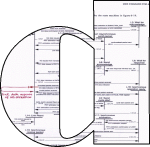
CONCURRENT AND MOBILE LANGUAGES
 | ||
This advanced course addresses Bachelor and Master students in Computer Science. Background in concurrency theory is of advantage but not mandatory.
Objectives
The aim of this course is to provide students with basic principles and concepts underlying a correct concurrent programming with or without code mobility.
This is achieved considering algebraic models, that is, simple languages that provide all basic features of real concurrent languages.
These models, commonly named process calculi (such as CCS, pi-calculus, Mobile Ambient), being simpler than real languages, are well suited to the study in a formal way typical problems of concurrency.
During the course there will be proposed examples of systems modeled as processes as well as of mobile agents.
Overview of the course
 | Remarks on CCS: syntax, operational semantics, strong/weak bisimulation |
 | Checking bisimilarity: bisimulations as games and decision algorithms |
 | Property specification and verification: Hennessy-Milner Logic |
 | Mobile systems |
 | pi-calculus: syntax and operational semantics |
 | Examples of mobile systems in pi-calculus |
 | Strong and weak bisimulation for pi-calculus |
 | Concurrent and distributed models |
 | Mobile ambients |
 | Probability extension: CCSp |
 | Security extension: Spi-calculus |
Reference books
Main book:
- R. Milner, "Communicating and Mobile Systems: the pi calculus", Cambrigde University Press, 1999.
Auxiliar book for the first part of the course:
- L. Aceto et al., "Reactive Systems: Modelling, Specification, and Verification". A draft of this book is available as online PDF.
Time and location
The course spans over the summer term 2012.
Lectures take place Mon 12:00-14:00 in E1.3, HS 001.
Tutorials and exercise meetings, when given, take place Fri 08:15-10:00 in E1.3, SR 016.
Exam schedule
Mid-term exam: June 11th at 12:00-14:00 in E1.3, HS 001
Final exam: August 3rd at 09:00-11:30 in E1.3, HS 001
Re-exam: August 28th at 10:00-12:30 in E1.3, HS 001
Registration
If you would like to participate in this course, please register for it via the CMS. An explanation how to do that is here (requires Adobe Flash Player).
Instructor
 | Dr. Andrea Turrini |